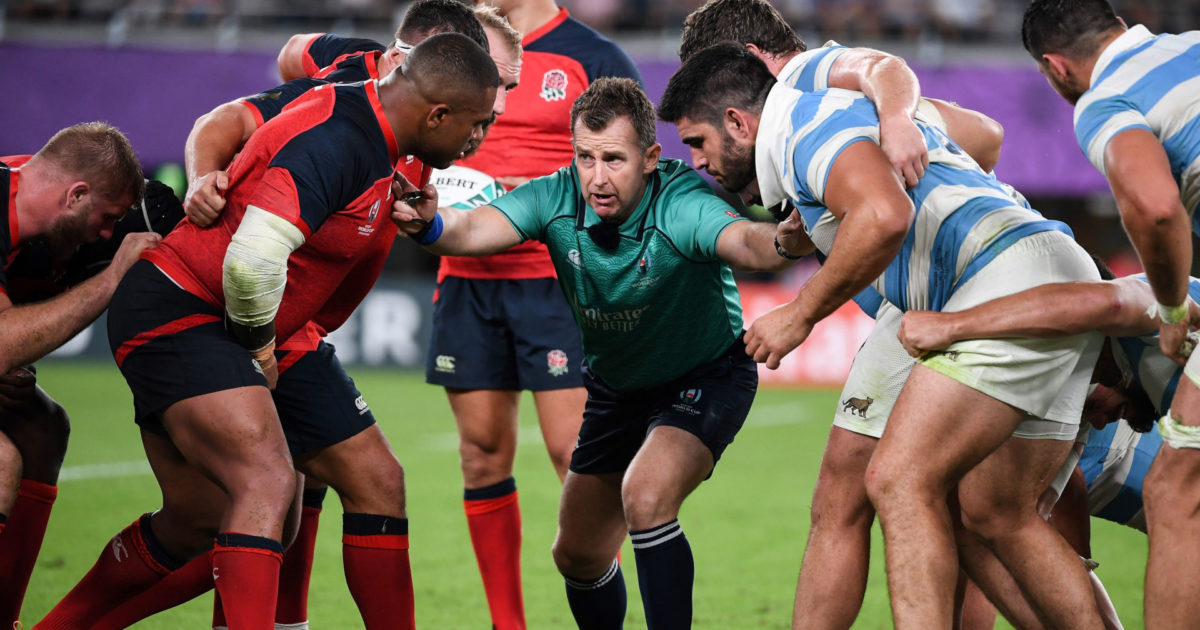Nigel Owens backs Law variation that could further disincentivise scrummaging

Referee Nigel Owens has singled out one particular Law variation that he believes could open up the game but which could, on the flip side, further disincentivise scrummaging. This week Rugby Australia confirmed seven law variations that will be applied in the upcoming Vodafone Super Rugby AU season, and Owens’ pet favourite is among them.
The new law states:
When an attacking player carrying the ball is held up in the in-goal or knocks the ball on play restarts with a goal-line drop-out. The drop-out is taken anywhere on or behind the defending team’s goal-line. It must be taken without delay and must pass the goal-line and go more than 5 metres. The defence must be back 5-metre and an opponent must not charge over the 5-metre line before the ball is kicked. If the ball crosses the 5-metre line but the bounces back play continues.’
This would mean five-metre scrums would become far, far rarer, and sides with strong scrums would lose the advantage of having an attacking platform just a few metres from their opponents try line.
Owens has already backed the ‘Orange Card’ but believes drop-outs for held up balls over the line would improve the game, as the law as is unduly harsh on the defending team.
Writing in his WalesOnline column, Owens explains: “As things stand, in each of those cases [knocks on and balls held up over the line] we currently have a five-metre scrum.
“But that can penalise the defending team, whether they have the put in or not, if the other side are superior in the set-piece. Believe me, when under pressure near your own try line, the last thing you want is to have to deal with a scrum against a side who have the edge in that department.
“The mistake, remember, was by the team going forward who knocked the ball on in the first place.
“A dropout from your own goal line is something completely different in the game and while I was not a fan at first of the proposed change from a scrum if you are held up over the goal line, the more I think about it, the more I’m beginning to see the advantages and feel it will be good for the game.”
Owens believes that the change would encourage heads up rugby and not the heads down, endless pick and goes near the line and or worse, endless reset scrums.
“So why is the change good? Well, how often have we seen teams from a few yards out pick and go, pick and go, try to bulldoze their way over the line?
“It can get quite monotonous. Sometimes they’ll score, sometimes they are held up, are awarded the scrum, strike the ball cleanly and then start going through the same routine again. Pick and go, pick and go. Or a referee’s worst nightmare, and that of many supporters I’m sure – a number of scrums on the five-metre line, reset, penalty, reset, reset, free-kick, penalty. Endless scrums.
“The thought process would need to change under the proposed new regulation. If the team in possession felt there would be just a sniff of a chance of being held up, but this time they would lose possession by the opposition getting a drop-out, they would need to think smarter.
“Look up, use the backs, get the ball out wide, try to play a bit more rugby, rather than just head down and charge.”
Owens also believes it could help reduce the number of head to head collisions that come with head-down, pick and goes near the line.
Opponents of the new Law might point towards it further disincentivising sides who put an emphasis on set-piece, and that it further denudes the need for scrummaging props. Selection pressure would swing back towards smaller, ball-carrying front rows, a move that World Rugby would undoubtedly welcome. The governing body’s long-held belief is that less and faster scrums and more ‘spectacle’ will help grow the game’s appeal, especially in winning over new fans.
Australian rugby, whose game is struggling and who have traditionally favoured open, running rugby, are on board with WR’s doctrine and a faster, free-flowing version of the code. Rugby Australia Director of Rugby, Scott Johnson said of his 7 new Law variations: “We assembled some of the best minds in the game from a range of different roles to look at adding some new attacking dimensions to the game while at the same time sticking to some key principles to preserve the fabric of the sport.
“A couple of the variations including the 50/22 and 22/50’s have been trialled previously in the NRC and we have added some principles around line drop-outs to encourage more short attacking kick options near the line, and a Super Time tiebreaker in the event of a draw.
“We will also zero in on the application of law around the breakdown and scrums, trying to limit some of the down time and improve the flow of the game.
“Throughout the process we stuck to the principle that whatever we changed, the game still had to be Rugby, and nothing could compromise the Wallabies’ preparation for Test Rugby. In fact, I believe the changes we have implemented will broaden and enhance the capabilities of our players.”
How the new drop-out Laws plays out remains to be seen, but both the game’s progressives and its purists will be watching with eagle eyes when Super Rugby Australia kicks-off.















































